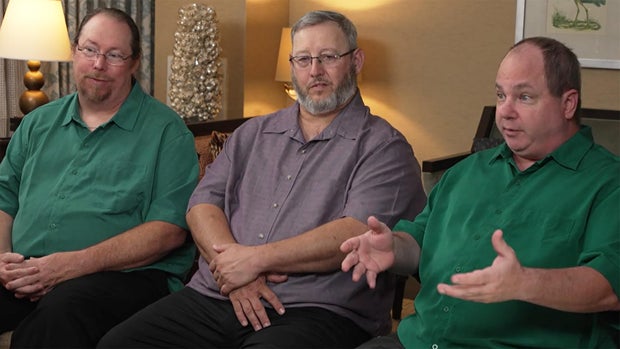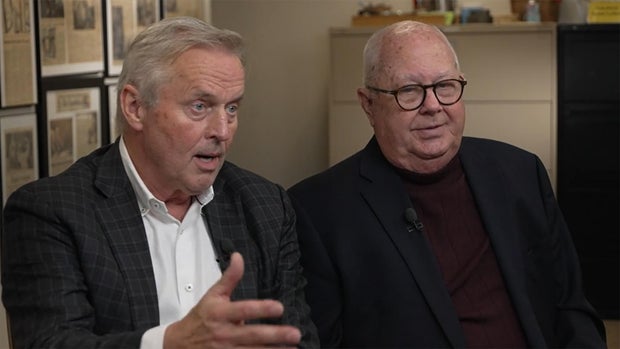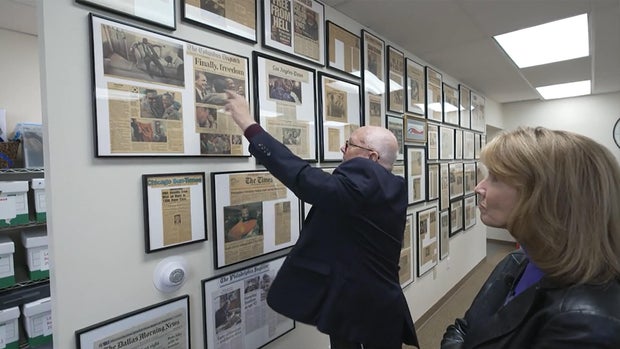CBS News
John Grisham on the wrongfully-convicted: “It’s not that difficult to convict an innocent person.”

What happened to Army veterans Mark Jones, Dominic Lucci and Kenny Gardiner on a January night in 1992 is almost impossible to believe. “It just blindsides you like a bolt of lightning,” said Lucci.
“You’re stunned and in shock,” said Jones.
Gardiner said, “One day you’re preparing to go before the promotion board, next day you’re fighting for your freedom.”
A chance encounter with a Savannah, Georgia, police officer investigating a murder cost each of them 26 years in prison for a crime they didn’t commit. “Why us? Why then?” said Lucci. “We had nothing in our lives that would even bring anybody to the assumption of that. No logical reason for us to have done any of that.”
CBS News
Their arrest, conviction and fight for freedom is as dramatic as the plot of any legal thriller, says bestselling author John Grisham, who has written nearly 50 of them. “Everything is there: drama, suffering, injustice, you name it,” Grisham said.
The story of the Savannah 3 is one of ten cases outlined in Grisham’s new book, “Framed,” co-written with Jim McCloskey, founder of Centurion, one of the country’s first non-profit organizations helping free those wrongfully-convicted. The cases they write about, they say, are not outliers; in fact, Grisham said, they’re “the tip of the iceberg. There are hundreds of these cases, maybe thousands.”
It’s only the second non-fiction work by Grisham, a former attorney, who sits on Centurion’s board. Asked about the wrenching emotions of these stories, he said, “We can’t begin to believe somebody would last for 20 years on death row, and walk out, and be able to function. And I’ve met so many of these guys over the years. They have endured something that rest of us cannot begin to comprehend.”
CBS News
With regards to the book’s title, “Framed,” who is doing the framing? “The police and the prosecutors,” McCloskey said. “The police are coercing witnesses into false testimony. Prosecutors are hiding exculpatory evidence from the defendant. It goes on and on.”
The walls of the Centurion office, in Princeton, New Jersey, are lined with some of the faces of those clients, and the numbers, say Grisham and McCloskey, are troubling. Nationwide, 3,600 people have been exonerated since 1989; 68 percent are people of color.
“Racism is a huge factor,” Grisham said.
“If you’re a person of color and indigent, you’ve got an uphill battle, because you have no resources to fight this wrongful conviction,” McCloskey said.
CBS News
And most of those wrongfully convicted — as the case of Kenny Gardiner, Mark Jones and Dominic Lucci demonstrates – were simply unlucky.
Back on January 31, 1992, the three soldiers, then in their early twenties, were together at a wedding rehearsal the day before Jones was set to get married. “Everything was finally really connecting and coming together in my life,” he said.
After dinner, the three soldiers drove 45 miles to a nightclub in Savannah for an impromptu bachelor party. Lucci said, “We tried to get into a strip club that wouldn’t let us in because [Mark’s] birthday was three months away. So, we went to a different one. Had no idea how to get to it.”
They stopped three times to ask police officers for directions, unaware that a drive-by shooting had taken place nearby, and they were about to cross paths with the only eyewitness.
Doubleday
Lucci said, “We asked the police officer that was walking across the street with a gentleman in a suit where the place was at. She said, ‘It’s right there.’ We assumed the guy in the suit was a detective. He was the eyewitness who told her, ‘That kinda looked like the car.'”
Shortly after, police took the three men in for questioning. They were arrested for murder hours later.
None of them had a criminal history. None of them knew the victim. And there was no gun found in their car. “There wasn’t a gun found anywhere; still, no gun has been found,” said Lucci.
There was, Jones said, nothing to connect them to the shooting. So, how did it go not just to arrest but to conviction? “Wrong place, wrong time,” he said.
There was also, says McCloskey, racial unrest in Savannah, and the murder of a Black man blamed on three white men put the city on edge. “They made a case against them to demonstrate to the Black leadership that they care as much about Black victims as they do white,” McCloskey said. “And these three innocent soldiers fell into their grasp, and away they went.”
At trial, the eyewitness, James White, identified two of the men as the shooters. Other witnesses, and prosecutors, painted them as racists and thrill-seekers. The jurors were out for 8 hours and 20 minutes, before returning a verdict of guilty of malice murder and possession of a firearm during commission of a crime.
“I literally almost passed out, ’cause I was so shocked,” Gardiner said.
They were sentenced to life in prison, plus five years. Lucci asked, “Does that mean I gotta serve life, and when I die in prison, you guys are gonna keep my body for five more years before you release it to my family? I don’t understand what’s going on here!”
Lucci wrote letter after letter to Centurion, which only accepts one or two new cases a year. But in 2009, McCloskey and his team took the case.
It still took years to get justice. Even after James White admitted he lied about the identification at trial, the men remained in prison, until December 20, 2017. The Georgia Supreme Court ruled that the state’s failure to produce a key piece of evidence to the defense at the original trial, even if inadvertent, violated the law. Lucci, Gardiner and Jones were finally free.
“It was a moment that gives you chills,” McCloskey said. “You can’t believe it’s actually happening, and you’re so happy for the families and the mothers, to bring their sons home to them.”
Kenny Gardiner now lives in Texas, and rents a room in a house where Mark Jones lives, along with his mother. They both have jobs delivering pizzas. Dominic Lucci moved to Ohio, where he works as a phone operator at the VA hospital. The three men, now in their 50s, are still the best of friends.
While the Georgia Legislature granted all three men some compensation, they can never get back what they lost.
“Think about what you’ve done from the time you are 21 to the time you’re 47, and lose all that – your college, your marriage, your house,” Gardiner said.
“Your children being born,” added Lucci.
“No work history. Twenty-six years of Social Security not put in,” said Gardiner.
And they can’t quite shake the past. They admit to having nightmares still. And when asked if they have trouble trusting people, Lucci laughed: “I don’t trust anybody! Family’s as far as it goes, and [Kenny and Mark] are included in family.”
These men are actually the fortunate ones, John Grisham says. There are untold others still waiting to be heard: “What we are trying to do is bring attention to these cases and show people these cases happen all the time It’s not that difficult to convict an innocent person; it’s virtually impossible to get one out.”
READ AN EXCERPT: “Framed” by John Grisham and Jim McCloskey
EDITOR’S NOTE: In response to questions about John Grisham’s reliance on the reporting of others in “Framed,” the author provided this statement to “Sunday Morning”:
“I’ve long been obsessed with stories of wrongful convictions, an issue that has been featured in many of my novels and nonfiction over the past thirty years. I have also been an outspoken advocate for criminal justice reform and serve on the boards of The Innocence Project and Centurion Ministries.
“There are eight pages total of source notes in ‘Framed.’ I clearly state that while Jim McCloskey has lived with these cases over the course of his remarkable life’s work at Centurion, I did not live these stories. I read about them, via newspaper and magazine articles, books, legal briefs, court opinions, and documentaries.
“And I have fully acknowledged and credited all of my sources for each and every chapter in ‘Framed.” While the facts of any case are irrefutable and unchangeable regardless of form, the writing in ‘Framed” is my own. To claim otherwise is simply and patently untrue.”
For more info:
Story produced by Michelle Kessel. Editor: Ed Givnish.
See also:
CBS News
House begins debate on new funding bill after previous vote failed

Watch CBS News
Be the first to know
Get browser notifications for breaking news, live events, and exclusive reporting.
CBS News
Here’s how much more it will cost to heat your home this winter

Americans are expected to spend more money heating their homes this winter than on holiday gifts, according to new research.
The elevated cost of staying warm indoors amid cold outdoor temperatures comes after an unusually hot summer, that led to households spending bigger shares of their budgets on cooling costs, compared with previous years, according to a report from the National Energy Assistance Directors Association (NEADA).
On average, spending on home heating this winter is projected to increase by 8.7% to $941, up from $866 last winter. The increased costs are attributed in part to both expected colder temperatures in the Northeast and Midwest states.
The new average expenditure on heating costs outpaces the $902 the average household is expected to spend on Christmas presents this year, according to a forecast from the National Retail Federation.
What’s driving up home heating costs?
There are different ways to keep residences warm. Families that use electricity to heat their homes are expected to face the largest increase in costs — more than 14% — which will bring the total up to $1,189 from $1,040 from mid-November through mid-March, which NEADA considers to be the winter period.
Driving up prices is the rising cost of updating and maintaining the electric grid. Plus, colder weather is expected to lead to increased consumption.
“It’s colder, and the cost of electricity is up as the grid is rebuilt. So we’re seeing both higher prices and greater usage,” NEADA Executive Director Mark Wolfe told CBS MoneyWatch.
Natural gas, propane and heating oil cost differences
Natural gas and propane users are also expected to be hit with bigger bills this winter. Heating costs for natural gas are up just over 3%, for an average cost of $634 for the winter period, compared with $615 for 2023-2024. Costs are expected to rise only modestly in line with wholesale prices.
Propane costs are up 4.4%, with families expected to spend an average of $1,231 heating homes, up from $1,179 last season.
Heating oil costs, by contrast, have declined 2.7%, which means average spending this winter will be $1,518, down from $1,560 last winter.
Early start to the season
November was colder than usual, with temperatures dropping prematurely after a “very expensive summer” of heat waves straining cooling resources, said Wolfe.
Blame climate change for the big swings in temperature, he added.
“Weather conditions can be very unpredictable even though over time, winters are getting warmer and summers are getting hotter. It’s not a straight line, and for consumers, it’s quite upsetting because higher utility bills are coming right before Christmas,” Wolfe said.
Steps to take now
There are steps consumers can take to help keep a lid on home heating costs.
Wolfe urges people to have their thermostats serviced now, before the coldest temperatures of the season roll in. That way, families won’t be on the hook for an emergency repair if their thermostat breaks in the middle of a cold front. A tune-up will also help heating systems run more efficiently, he said.
Always close the furnace flue, or else it will lead heat outside the house, advises Wolfe. Lastly, manually turn down the heat at night, if you can, to save up to 10% on your energy bill.
CBS News
The Pager Plot | Sunday on 60 Minutes

Watch CBS News
Be the first to know
Get browser notifications for breaking news, live events, and exclusive reporting.














